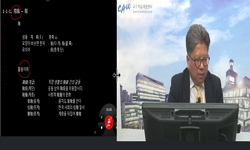The present research analyzed 3 articles, 開化ノ度ニ因テ改文字ヲ発スベキノ論(1874), 日本の文学(1888), 国家文運の前途(1901), of Nishimura Shigeki (西村茂樹) to investigate how it has become possible that the ‘Chinese...
http://chineseinput.net/에서 pinyin(병음)방식으로 중국어를 변환할 수 있습니다.
변환된 중국어를 복사하여 사용하시면 됩니다.
- 中文 을 입력하시려면 zhongwen을 입력하시고 space를누르시면됩니다.
- 北京 을 입력하시려면 beijing을 입력하시고 space를 누르시면 됩니다.
부가정보
다국어 초록 (Multilingual Abstract)
The present research analyzed 3 articles, 開化ノ度ニ因テ改文字ヲ発スベキノ論(1874), 日本の文学(1888), 国家文運の前途(1901), of Nishimura Shigeki (西村茂樹) to investigate how it has become possible that the ‘Chinese’ characters are defended as ‘Japanese’ characters in the modern Japanese society.
The biggest feature of 開化ノ度ニ因テ改文字ヲ発スベキノ論 is that Nishimura did not object to the abolition of Chinese characters, instead, he criticized it. However, given that the bases for advocacy of Chinese characters in later generations have already been cited in this article, it would be reasonable to consider that it was not any change in Nishimura's opinion about Chinese characters, but a change in the social situation at that time.
In 日本の文学, Nishimura strongly denounced the abolition of Chinese characters. He advocated Chinese characters on account of its "historicity." Furthermore, Japan's historical individuality was embodied in 'the Orient' through confrontation with the Occident. To note, Nishimura was not negative about the limitations of the Chinese charaters in this article.
In 国家文運の前途, Nishimura’s tone put much value on the "presentiality", so he argued that all the Chinese characters used currently are necessary. It is possible that Nishimura had a sense of crisis about the abolition of Chinese characters recurred on the first Sino-Japanese War.
Overall, the change of Nishimura’s opinion on Chines characters suggested the possibility that Japan in the Meiji period realized individuality through the "Oriental" in contrast to the Occident, and defended the Chinese characters, which are "Oriental characters".
동일학술지(권/호) 다른 논문
-
ビデオ教材『映像で学ぶキャリア-日韓の学生が専攻言語を生かすために-』の制作と公開
- 한국일본학회
- 松﨑真日
- 2023
- KCI등재
-
五代目尾上菊五郎と尾上家の家の芸― 新古演劇十種を手掛かりに ―
- 한국일본학회
- 김지혜
- 2023
- KCI등재
-
미야베 미유키의 사회파 미스터리를 통해 본 ‘2.26 사건’― 『가모우 저택 사건』을 중심으로 ―
- 한국일본학회
- 강지연
- 2023
- KCI등재
-
혐오에 저항하는 경계 넘기는 가능한가?― 후카자와 우시오(深沢潮) 소설에 나타난 교차적 상상력을 중심으로 ―
- 한국일본학회
- 김지영
- 2023
- KCI등재





 eArticle
eArticle






